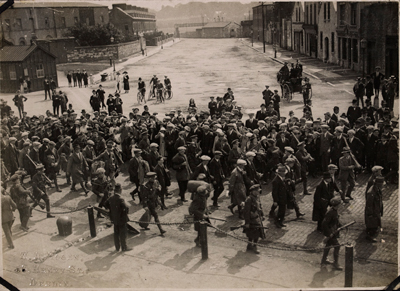New Free State public safety legislation condemned as worse than British repression
Dublin 11 July 1923 - New public safety legislation proposed by the Free State government is more extreme and repressive than regulations imposed by the British authorities in recent years, the Dáil has been told today.
Contributing to a debate on the Public Safety (Emergency Powers) Bill, the leader of the Labour Party, Mr. Thomas Johnson alleges that the Restoration of Order in Ireland Regulations Act introduced in August 1920 and Defence of the Realm Act introduced in the wake of the outbreak of the Great War were ‘mother’s milk’ compared to what was now being proposed.
Mr. Johnson and his Labour colleagues, together with Mr. Gavan Duffy, questioned the need for the new powers and put forward a series of amendments which were either ruled out of order or rejected. A key feature of the Public Safety (Emergency Powers) Bill is the conferral upon an Executive Minister of powers to arrest and detain in custody in any place in Saorstát Eireann of any person.
Defending the Bill, the Minister for Agriculture, Mr. Patrick Hogan, painted a scenario where, in a month or so, a ‘Judge should find...a state of war does not exist’ and the military would have no power to interfere in these areas.
‘What are we providing for? The Irregulars, through their leaders, have stated that the arms which were dumped all over the country are to be used at the first opportunity. We all know that it is quite possible, and even probable, that a momentary peace may be organised with a view to getting out the prisoners in order to begin again.’
What was the Defence of the Realm Act that the new Bill is purported to be more repressive than? Historian Will Murphy explains
Mr. Gavan Duffy TD, a former minister in the provisional government, attempted to insert without success a section in the Bill that would have had Deputies Sir James Craig, Richard Hayes, and Patrick MacCartan, and Senator Henry L. Barniville, as members of the medical and surgical professions in the Oireachtas, constituted as a Parliamentary Committee of inspection who would have access to the existing detention camps for both purposes of sanitary control and for the purposes of monitoring the health of prisoners. As matters stood, Mr. Gavan Duffy pointed out, nobody except the official doctors had the right to visit a prison.
Responding to the Minister for Home Affairs, Mr. Kevin O’Higgins dismissed the principle of the amendment as ‘objectionable’ and indicated that to support it would be to effectively vote no confidence in the ‘paid officers of the Government, and in the Minister or Ministers to whom they are responsible.’
A further proposal from Mr. Cathal O’Shannon urged that the text of the Bill delete the proposal that a person could be arrested and detained based on a report from the military authorities that the detention of such a person is a matter of military necessity. He contended that military necessity could only refer to armed revolt.
Mr. O’Shannon added that a new definition of military
necessity would then arise and it should not be in the power of
any minister to accept the bare statement of the military
authorities. The amendment proposed was nevertheless defeated and
the powers of arrest and detention conferred by Section 1 of the
Bill was defeated by 45 votes to 12.
[Editor's note: This is an article from Century Ireland, a fortnightly online newspaper, written from the perspective of a journalist 100 years ago, based on news reports of the time.]





















